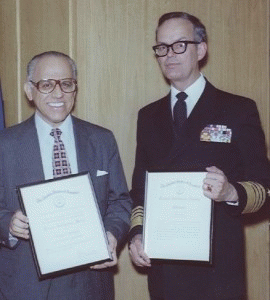Reprinted
with the permission of "JFK
Facts." Jefferson Morley is editor of JFK Facts

Retired CIA officer George Joannides (left) received the Career Intelligence Medal in 1981, two years after misleading House investigators about what he knew about Lee Oswald. (Photo credit: CIA)
(Image by CIA/CIA web site archives) Details DMCA
The scandal started quietly last week when Sen. Mark Udall wrote a letter to President Obama, alleging that the CIA had taken "unprecedented action" against investigators who wrote the Senate Intelligence Committee's still-classified report on the U.S. torture program.
Then McClatchy News reported that the CIA monitored a Senate computer system after staffers allegedly removed records from agency's headquarters without authorization.
When Intelligence Committee Chair Diane Feinstein went public with more of the details on Tuesday the story mushroomed into a quasi-constitutional confrontation.
"Independent observers were unaware of a precedent for the CIA spying on the congressional committees established in the 1970s to check abuses by the intelligence agencies," said the Guardian .
In fact, there is a precedent. While electronic surveillance may be new, the CIA has used its espionage techniques to thwart Hill scrutiny before. In 1978, the CIA went so far as to plant a spy in Congress' inquiry into the murder of a sitting president.
The proof emerged in 2010 when a top CIA official stated in a sworn affidavit that the agency planted an "undercover" officer into the House of Representatives investigation of the assassination of President John F. Kennedy.
The House investigators came away feeling much like the Senate Intelligence Committee does today: deceived and manipulated. Then as now, it seems the threat of exposure and embarrassment on a sensational issue of the day -- be it torture or assassination -- prompted senior CIA officials to subvert Congress's efforts to hold the agency accountable for its actions.
Now Washington is asking why agency officials thought they had the right to spy on a congressional investigation. The answer is that history has shown they can get away with it.
Undercover lawyer
Just as the National Security Agency feels under siege today, so the Central Intelligence Agency felt in the mid-1970s. A string of revelations coming out of the Watergate scandal showed senior agency officials had supported the Watergate burglars as well as engaged in assassination of foreign leaders, torture, and mind-control experiments. Particularly appalling to the public and the Congress was the revelation that senior CIA officials had been plotting to assassinate Cuban president Fidel Castro at the very moment JFK was gunned down in Dallas.
In 1978, the House of Representatives reopened the investigation of Kennedy's assassination. Soon investigators from the House Select Committee on Assassinations (HSCA) were aggressively asking for specific records held in CIA files.
In response, the CIA General Counsel Office assigned George Joannides, a dapper lawyer from New York City who had spent 28 years in the clandestine service, to serve as liaison to the investigators. Unbeknownst to Congress, Joannides "served undercover" when acting as the agency's representative to the HSCA, according to a sworn affidavit (p. 10) from Information Coordinator Delores Nelson, filed in Washington federal court in 2010.
Joannides was, in essence, a spy. To the Congress, he presented himself as a staff attorney who would facilitate the investigation by retrieving documents and arranging interviews with former CIA personnel.
(Note: You can view every article as one long page if you sign up as an Advocate Member, or higher).




